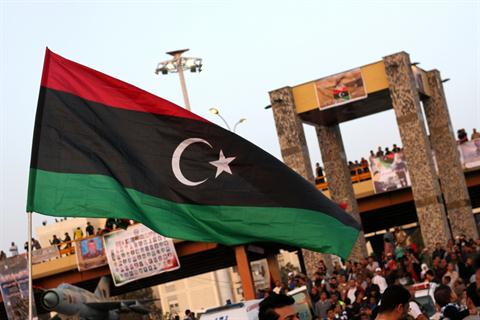By Heba Fahmy
CAIRO: Following a nine-hour court session, presiding judge Ahmed Refaat announced that the final verdict in Hosni Mubarak’s trial will be pronounced on June 2, adding that the session will be aired live on national television.
In what is known as the trial of the century, Egypt’s ousted president Mubarak, his ex-interior minister and six of his aides face charges of complicity in killing protesters during the popular uprising that toppled the regime in January 2011. Mubarak also faces corruption charges along with his two sons Alaa and Gamal and businessman Hussein Salem in the same case.
During the Wednesday hearing, where defense lawyers made their final statements, El-Adly addressed the court for over an hour and a half, stressing that he ordered his troops not to use live ammunition against protesters and to exercise extreme self-restraint.
He began his speech by reciting verses from the Quran.
“I swear that what I say is the truth and not a bid to get out of a murder crime,” he said.
El-Adly defended himself and the police against charges of murder, drawing applause from some police officers standing at the back of the courtroom.
He claimed that “foreign elements”, including members of Lebanese Shia group Hezbollah and the Palestinian Islamist movement Hamas, infiltrated the protesters and shot at them and at the police.
He also offered his condolences to the families of those killed, triggering the outrage of lawyers in the courtroom who shouted, “Butcher! Execution!”
Osman El-Hefnawy, one of the lawyers representing the victims’ families, said that El-Adly expects to be sentenced to death, since all the evidence is against him.
“He’s trying everything he can to gain the court’s sympathy and secure an acquittal, but I don’t believe the court bought it,” El-Hefnawy told Daily News Egypt.
El-Adly boasted about his achievements as interior minister, saying that terrorism incidents resided, the economy prospered and the people felt safe.
He said that only 30 terrorists were killed during his tenure, despite the fact that Egypt was the target of several terrorist attacks. He added that he intervened to stop the execution of four terrorist leaders, because he believed they could be “talked out of ” their extremist ideology.
El-Adly was appointed Minister of Interior 14 years ago in 1997, replacing then-minister Hassan El-Alfi who was immediately discharged following a terrorist attack in Luxor that left over 60 dead. He claimed that he saved the country which was “drowning in terrorism”.
However, under El-Adly, the interior ministry has often been described as “corrupt” and “infamous for torture crimes”, including the death of now iconic figures like Sayed Belal and Khaled Saeid in Alexandria, who’s brutal killing is widely recognized as one of the triggers of the January uprising.
Two policemen were convicted with using excessive that led to Saeid’s death in June 2010. The sentence was appealed. Sayed Belal was also allegedly tortured to death by police to force him to falsely confess to his involvement in a bombing outside Al-Qeddesine Church on New Year’s Eve, 2011. A trial of the officers involved started this week.
Media spokesman of The Egyptian Initiative for Personal Rights (EIPR) Ramy Raoof said that El-Adly exploited emergency law to give his police forces absolute power over civilians, without holding them accountable for their crimes.
“El-Adly activated a number of oppressive laws that are against human rights, most prominently emergency law,” Raoof told DNE.
Ousted President Hosni Mubarak and his two sons Gamal and Alaa, refused to speak delegating their lawyer Farid El-Deeb to speak on their behalf.
“I have no comment,” Mubarak told the judge Wednesday. “What the lawyer said is enough.”
The judge had noted earlier a report presented by the Prosecutor General regarding a memo issued by parliament’s health committee, deeming Tora prison hospital adequate to receive Mubarak.
The report recommended that Mubarak be transferred from the International Medical Center where he is currently detained pending trial, to Tora since his health condition does not warrant special treatment.
Mubaral’s lawyer El-Deeb slammed the report saying that this was intervention by the PA in judicial affairs.
“I was hoping that the Prosecutor General would completely reject these recommendations,” El-Deeb said.
“The legislative authority cannot interfere in the judiciary,” he added.
However El-Hefnawy disagreed, saying that the PA was the only legitimate authority elected by the people in Egypt. “The court should listen to the PA,” he said.
PA Speaker Saad El-Katatny said during Monday’s PA session that parliament would never intervene in court rulings.
The court session Wednesday started on a rough note as tensions rose between Judge Ahmed Refaat and civil rights lawyer Abdel-Aziz Amer.
After over an hour of recess, Refaat demanded that Amer be removed from the court before he resumes the session, amid the support of many other civil rights lawyers representing the victims’ families.
“This lawyer keeps disrupting the trial and he’s not even a member of the lawyer’s syndicate,” El-Hefnawy said.
Amer was behind a failed attempt to replace Refaat, accusing him of being biased in favor of the defendant which led to a two-month hiatus in proceedings that resumed late December.
Outside the courtroom, dozens of Mubarak supporters and opponents were separated by police.
Both sides chanted and held up banners. One man in the anti-Mubarak crowd held a noose aloft to underline calls for the once all-powerful strongman to face the death penalty.
The defendants are charged with complicity in the killing of 225 protesters and injury of over 1,300 who were targeted in public squares, not in front of police stations from Janu.25-28 before the police withdrew and army forces were deployed.
If convicted, Mubarak and his aides could face the death penalty, but most observers believe that it is highly unlikely.

